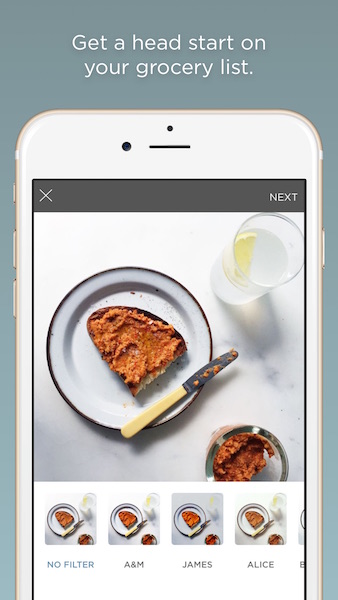Amanda Hesser and Merrill Stubbs are renowned food editors, authors, influencers and entrepreneurs. They’re also co-founders of Food52, a food-tech startup based in NYC.
Since its inception in 2009, Food52 has become the food community for passionate home cooks, food geeks and serious eaters everywhere. It’s also established itself as a firm favorite with our editorial team. Most recently, we’ve been very taken with their new (Not)Recipes app (learn more in the gallery above).
As we approach Food Loves Tech on June 10-12 (tickets here!), we asked asked both co-founders to share their thoughts about Food52, and the future of food:
Edible Manhattan: Tell me more about Food52.
Amanda Hesser and Merrill Stubbs: We wanted to create a place where cooks could get everything they needed to eat—and live—well. And we wanted to nurture a community in which individual voices were celebrated, not where people were talked down to. [With Food52], we’re harnessing the power of community and technology to inspire people everywhere to eat thoughtfully and live joyfully.
EM: Your cooking manifesto reads: “How you eat is how you live.” How are you making that the focus at Food52?
AH and MS: The Food52 community is constantly inspiring each other to up the ante—whether it’s with a new recipe, a handsome hand-thrown bowl to spiff up our table, a beautiful photograph of a sauce bubbling on the stove or an easier way to cut an avocado. It’s the sum of these small but important moments that makes our manifesto come to life.
EM: Why did you choose to headquarter your company in New York City?
AH and MS: We’re both New Yorkers, and there was no question in our minds that this was the best place to start our company. It has a food culture that can’t be rivaled, it’s a hub for media, and the tech community is thriving—basically, all the stars aligned!

EM: How does being a food tech company in New York City versus Silicon Valley or other tech hubs impact your business and brand?
AH and MS: We may be at a tech conference one day, a digital media event the next and a cookbook launch the following night. We wouldn’t have the same kind of access to diverse communities of experts in all of the fields we touch anywhere else.
EM: Would you describe Food52 as a food tech company?
AH and MS: Technology drives everything we do, and food is our heartbeat. But we’re also breaking the mold in digital media and commerce. We see ourselves as all of these things, in one winning package.
EM: Has working in food-tech changed your perceptions of either of these industries?
AH and MS: Starting a business has its challenges, but it quickly brings into sharp relief the limitations of working at bigger companies. A small business rooted in technology can be nimble and swift—not often words you hear associated with corporations. It feels great to be able to get things done every single day, rather than wading through levels of approvals.
EM: Where does food tech converge in your business? What’s been the biggest challenge and success to date in this area?
AH and MS: Where doesn’t it converge?! To us, the boundaries are always blurred. Even with our offline endeavors, there are always technology components that can’t be separated out. At our holiday pop-up shop, for example, we had iPads in the store for people to order additional products online, and we used social media and email to market the shop and sensors to track foot traffic.
The biggest challenge is identifying the best tools to use for every situation, and then making sure everything works together to create a great, and seamless, experience for our community members.

EM: Which innovations do you find the most challenging to contemplate or deal with as a consumer? Which ones make you the most excited (and why)? Does the business leader in you change that perception?
MS: Virtual reality is still a pretty fuzzy concept for me, because I haven’t had any firsthand experience with it. But it seems like the possible applications for food and cooking could be really interesting. Also someone really needs to figure out a better system for food packaging that doesn’t involve so much waste—I have faith it will happen, but I certainly don’t want to be the one to tackle it!
EM: Finally, what will make the greatest impact on changing the way we eat by 2020?
MS: I think environmental conditions and concerns will continue to have a huge impact on how we eat. I imagine that eating and cooking with local ingredients will continue to gain momentum, and I hope increased demand will help drive costs down and make these products more accessible to a larger population.
AH: How we shop for food is evolving, and what it means to sell groceries is changing every minute as food delivery, meal kits, CSAs and new grocery store formats are cropping up. We feel excited by this because the easier it is for people to buy great ingredients, the more cooking they’ll do.
Images courtesy of Food52.



